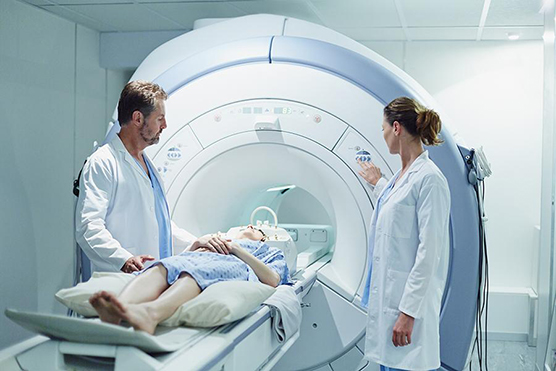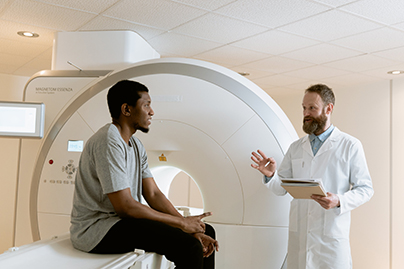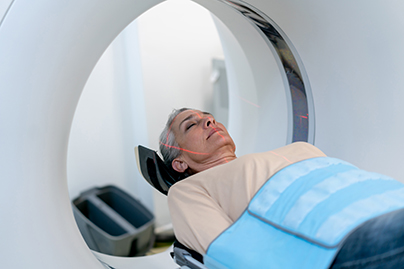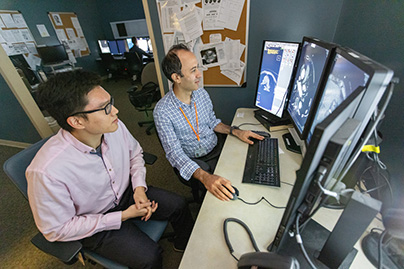MRI
You can expect safe and effective MRIs at any of our convenient locations. We offer extensive experience in all types of MRIs — including cardiac, breast, brain and musculoskeletal.
Medically reviewed by Elizabeth Morris, M.D. on Nov. 30, 2023.

What is an MRI (Magnetic Resonance Imaging)?
MRI is a noninvasive imaging test that uses a high-powered magnetic field plus radio waves to create detailed images. We often use a contrast fluid (given through an IV in your arm) to highlight tissues and blood vessels during an MRI.
Ways MRI Can Help Diagnose and Treat
We can use MRI to get a clearer view of your:
- Bones and ligaments
- Brain and spinal cord
- Heart and blood vessels
- Internal organs
Our experts can use MRI to:
- Analyze blood flow in vessels
- Assess heart function or damage
- Detect tumors in your breasts, pancreas, kidney, liver, spleen, uterus, ovaries and prostate
- Determine the extent of a brain injury from trauma or stroke
- Diagnose brain aneurysms or tumors
- See if tendons or ligaments are torn
- Guide treatment and assess effectiveness of treatments
Advanced MRI Exams
Our expert radiologists use MRI to detect issues that can’t be clearly seen in X-rays. We have a variety of advanced MRI machines that specialize in diagnosing conditions in various areas of the body.
Cardiac MRI (Heart and Chest MRI)
Our specialized cardiac MRI machines allow us to clearly see any issues in your heart, chest and surrounding blood vessels. A cardiac MRI may include getting an IV of contrast fluids. This helps us better visualize blood flow. We also place ECG stickers on your chest to help capture images of your heart while it’s beating.
Abdominal and Pelvic MRI
We use several types of MRIs to assess issues in your abdomen and pelvis that could be affecting your intestines, pelvic floor, liver or pancreas. Depending on your condition, you may receive contrast fluids through an IV. This helps us get clearer images of your organs.
Prostate MRI
Using MRI technology, sometimes along with contrast fluid, we can get detailed images of your prostate gland. These can help us detect tumors and also assess the effectiveness of prostate cancer treatment.
Brain and Spine MRI
MRI scans of the brain and spine can detect injuries or structural issues affecting your brain or spinal cord. In some cases, we use contrast fluid to highlight areas we need to see in greater detail.
Breast MRI
People with dense breasts — or those who had something suspicious detected during a mammogram — may need a breast MRI. This test creates more detailed images (enhanced by contrast fluid) of breast tissue. We also use MRI to guide needle biopsies of breast lumps.
Musculoskeletal MRI
Musculoskeletal MRI detects issues and injuries within your joints, ligaments, tendons, muscles and bones.
Request an Appointment
As Sacramento's No. 1 hospital, you'll benefit from unique advantages in primary care and specialty care. This includes prevention, diagnosis and treatment options from experts in 150 specialties.
Referring Physicians
To refer a patient, submit an electronic referral form or call.
800-4-UCDAVIS
Patients
Call to make an appointment.
Consumer Resource Center
800-2-UCDAVIS
This noninvasive scan typically requires little or no preparation. The test does require being inside the MRI machine tube for the duration of the exam — which can take an hour or more. We provide earplugs to help with the noise the machine makes. If the test makes you anxious or you fear you’ll get claustrophobic, your provider can prescribe a sedative to take before the scan.
-

Before Your MRI
For most MRI scans, you can eat, drink and take medications as usual. For some specialized MRIs, you may need to fast (not eat) for 4 to 6 hours prior. Your provider will give you detailed instructions depending on your specific test.
-

During Your MRI
You’ll receive earplugs to help reduce the noise and make you feel more comfortable during the exam. If your MRI requires contrast fluid, the technician will insert an IV into your arm and administer the fluid. You’ll also have a “call ball” you can use to contact the MRI technologist. If you squeeze the ball, they will immediately stop the exam and move you out of the machine.
-

After Your MRI
If you received a sedative before the MRI, someone needs to pick you up from the appointment and drive you home. A radiologist will review your MRI images and send the results to your provider, usually within 24 hours.
Potential Risks of MRI
MRI does not use any radiation (unlike X-rays and CT scans), so the exam poses few risks. The powerful magnets in the MRI machine will affect any electrically active medical devices (such as pacemakers) or any metal in your body. If you’re pregnant, talk to your provider about whether MRI is a safe choice.

Ranked among the nation’s best hospitals
A U.S. News & World Report best hospital in cardiology, heart & vascular surgery, diabetes & endocrinology, ENT, geriatrics, neurology & neurosurgery, and pulmonology & lung surgery.

Ranked among the nation’s best children’s hospitals
U.S. News & World Report ranked UC Davis Children’s Hospital among the best in neonatology, nephrology, orthopedics*, pediatric & adolescent behavioral health, and pulmonology & lung surgery. (*Together with Shriners Children’s Northern California)

Ranked Sacramento’s #1 hospital
Ranked Sacramento’s #1 hospital by U.S. News, and high-performing in aortic valve surgery, back surgery (spinal fusion), COPD, colon cancer surgery, diabetes, gynecological cancer surgery, heart arrhythmia, heart failure, kidney failure, leukemia, lymphoma & myeloma, lung cancer surgery, pacemaker implantation, pneumonia, prostate cancer surgery, stroke, TAVR, cancer, orthopedics, gastroenterology & GI surgery, and urology.

The nation’s highest nursing honor
UC Davis Medical Center has received Magnet® recognition, the nation’s highest honor for nursing excellence.

World-class cancer care
One of ~59 U.S. cancer centers designated “comprehensive” by the National Cancer Institute.

A leader in health care equality
For the 13th consecutive year, UC Davis Medical Center has been recognized as an LGBTQ+ Healthcare Equality Leader by the educational arm of America’s largest civil rights organization.
